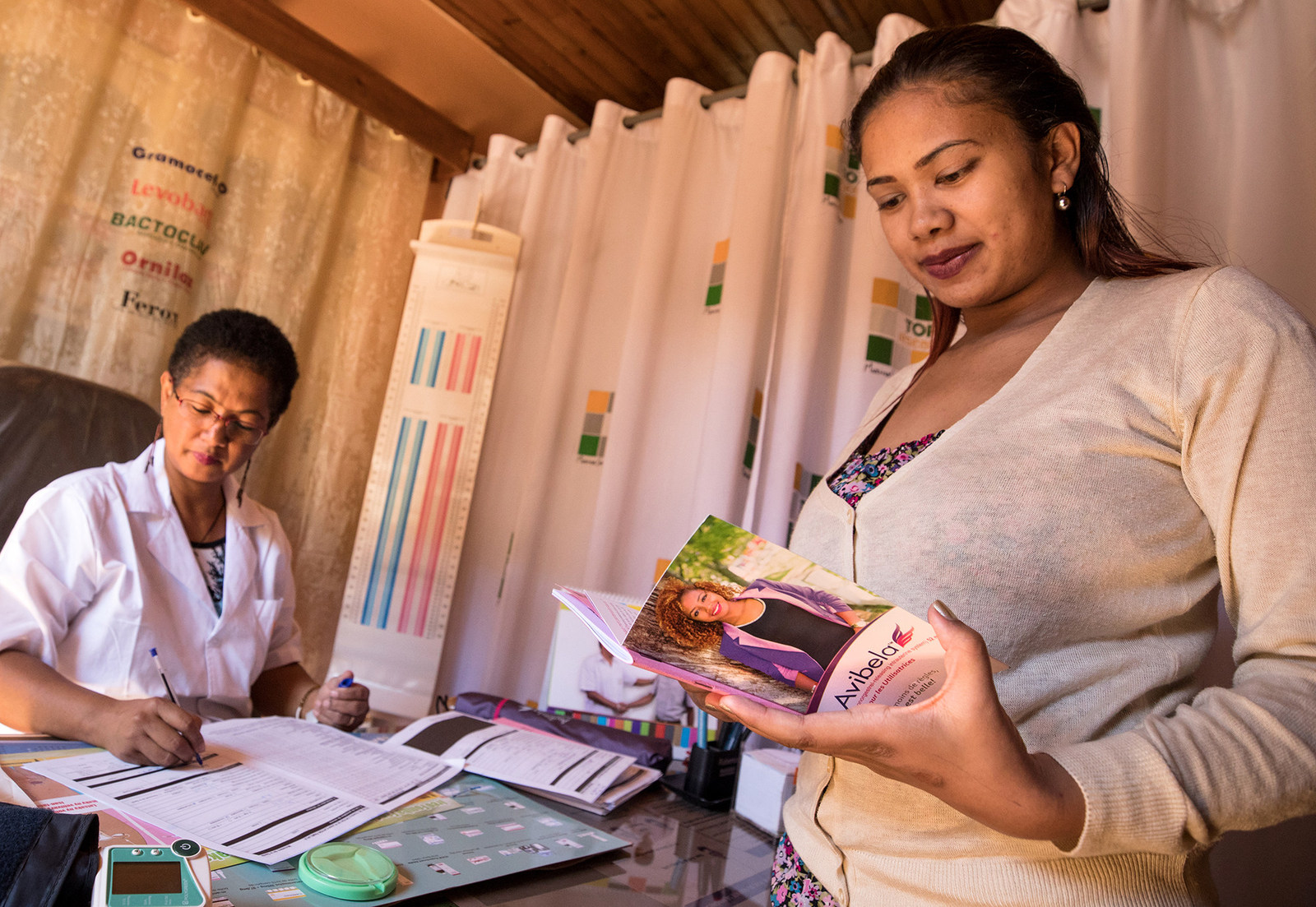
Considering how innovative business models can improve access to quality medicines for women regardless of where they live, their insurance status, or whether they can pay will be the topic of the next WDI Global Impact Speaker Series.
Sally Stephens, chief business officer of Medicines360, the only nonprofit pharmaceutical company with a marketed product in the U.S., will speak at 5 p.m. on Tuesday, Feb. 12 in room R0230 at the Ross School of Business. The talk, “Closing Critical Gaps in Women’s Healthcare Around the World: The Story of Medicines360, A Nonprofit Pharma Company,” is free and open to the public.
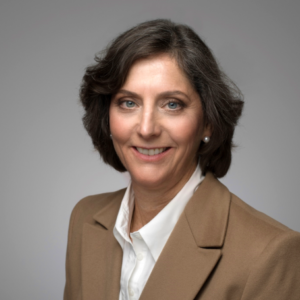 Medicines360 has a unique mission-driven business model and an innovative partnership with Allergan. As its name implies, Medicines360 has a global focus and is driven to meet an unmet need for women around the world, including in the U.S. That is, affordable, long-acting contraceptives.
Medicines360 has a unique mission-driven business model and an innovative partnership with Allergan. As its name implies, Medicines360 has a global focus and is driven to meet an unmet need for women around the world, including in the U.S. That is, affordable, long-acting contraceptives.
Its first product is a hormonal intrauterine device, or IUD, which had been out of reach for many women because of the high cost of the sole brand on the market. Medicines360 offers its FDA-approved Liletta at a discounted price to public sector clinics across the U.S. to increase access to this important family-planning product.
Additionally, Medicines360 has been working with international health organizations to offer the product, branded as Avibela in low- and middle-income countries, to also increase access to these markets. Avibela was launched in Madagascar in 2018. Sales of Liletta in the U.S. help fund research and development efforts by the company to bring contraceptives to countries such as Madagascar.
Stephens will discuss the history of Medicines360, its successes and its plans to expand access to its affordable medicines and products for women.
“I think that students will be intrigued by how Medicines360 is reinventing the pharmaceutical business model through a non-profit company with a strategic focus in women’s health and underserved patient communities here in the U.S. as well as globally,” said Andrea Bare, senior advisor with WDI’s Healthcare focus area. “Sally has a unique blend of corporate as well as non-profit organizational experience, and she is bringing this to bear in her role as chief business officer. This talk will be interesting for insights on alternative business models, serving underserved populations, and an interesting career trajectory.”
Stephens, who joined Medicines360 in 2011, leads the corporate strategy, business development, marketing and sales, and the developing countries programs at the organization. She has extensive experience working with nonprofit and for-profit organizations, including the New York Blood Center, Kaiser Permanente and nine years as vice president of business development and strategy at Novartis Diagnostics (formerly Chiron Corporation).
She received her bachelor’s degree in chemical engineering from UC Berkeley and her MBA in healthcare management and finance from the Wharton School at the University of Pennsylvania.
(Photo courtesy of Evelyn Hockstein/Medicines360)
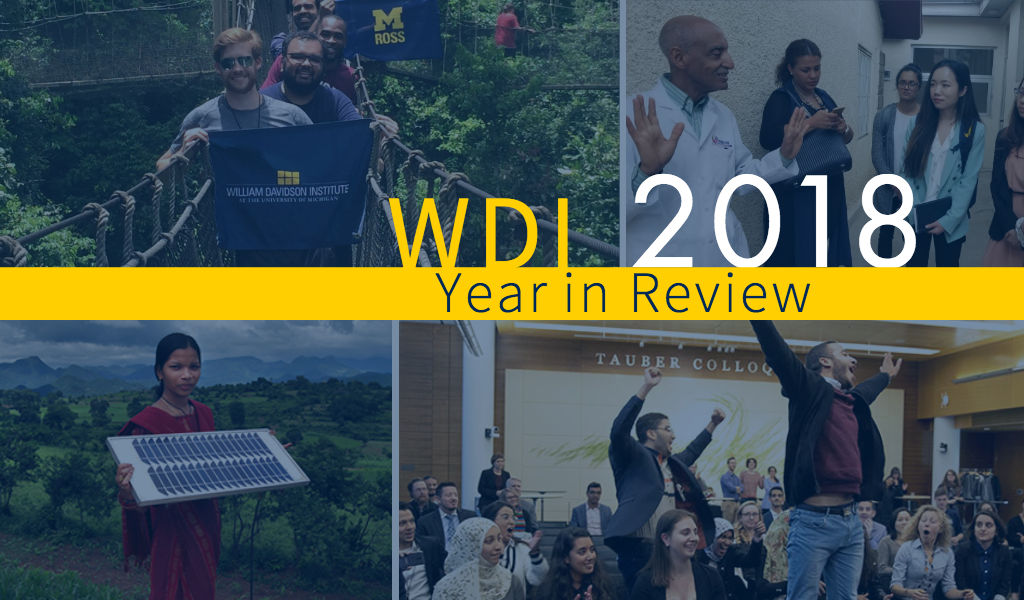
Improving reproductive health supply chains to boost access to family planning products in Mozambique. Educating senior managers from around the Baltics. Helping both investors and enterprises they support better measure impact in Latin America. Creating new MBA-level curriculum for universities in Papua New Guinea.
These partner projects are just a few examples of the work WDI performed around the world in 2018. Working with a robust set of private sector and nonprofit partners on a diverse number of projects, WDI effectively applied business skills in low- and middle-income countries (LMICs) in impactful ways.
In all, WDI teams worked on more than 40 projects with more than 40 partners in more than 40 countries this past year that focused on our core consulting sectors—education, energy, finance and healthcare, as well as our management education programs, entrepreneurship development, measurement and evaluation services and the deployment of University of Michigan graduate students around the world.
“In 2018, I was impressed by the degree to which the Institute integrated the energy and talents of our staff, University of Michigan students and faculty leaders to address multiple challenges facing for-profit and non-profit organizations,” said WDI President Paul Clyde. “While most of these projects were in one of our key focus areas—Energy, Healthcare, Management education or Finance—many drew on expertise that cut across sectors or disciplines to deliver more complete solutions.”
WDI’s project work leveraged the knowledge and expertise of the Institute’s staff, its research fellows and faculty from the University of Michigan and other world-class higher education institutions to develop business solutions in LMICs. Additionally, WDI disseminated what it learned doing work in the field through published research reports, academic journal articles and notable blog posts. The Institute also contributed to U-M student and faculty enrichment by hosting several compelling speakers at the Ann Arbor campus.

Members of the LIFE project consortium visit a produce stand in Turkey and interviews the owner on how a green grocer sources his produce and his perspective on how he could potentially benefit from the LIFE Food Enterprise Center.
Our work in 2018 spanned the globe and included projects on a wide variety of topics and issues. Among the work, WDI launched a new consulting focus area in the energy sector, connected hundreds of students using virtual technology, developed a model to train nurses for a planned hospital in Ethiopia and trained refugees in the food industry in Turkey. Here are a few highlights from our project work this past year.
Throughout the past year, WDI has widely shared its research and field work a to a broader audience through a number of publications and online journals.
“Participating in the project to test the framework provided us a holistic understanding of poverty. WDI gave us the tools to guide decision-making and track progress towards broader development goals through data collection and analysis.”
—Mónica Varela, director of impact for the Clinton Giustra Enterprise Partnership
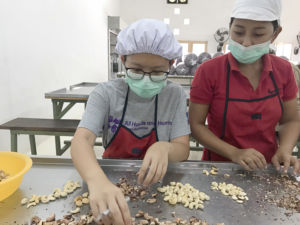
WDI intern Nadia Putri (pictured left)
A number of WDI employees penned blogs on their work or trends impacting their research that appeared on the Institute’s website.
In 2018, WDI hosted speakers as part of the the Institute’s Global Impact Speaker Series. While on campus, many of the speakers sat down for one-on-one interviews.
In sub-Saharan Africa, the private sector provides family planning solutions to almost 40 percent of women. But that isn’t the case in Malawi, a country that’s long been dominated by donor-funded commodities. Erika Beidelman and Andrea Bare at the William Davidson Institute explore Malawi’s family planning landscape, highlighting five factors that may be limiting the private sector’s involvement – issues that may apply to other countries with histories of donor-funded healthcare.

In sub-Saharan Africa, the private sector is a common provider of family planning solutions, used by almost 40 percent of women in the region. But this isn’t the case in Malawi.

Andrea Bare

Erika Beidelman
To find out why, we spent two weeks in-country this past September, exploring Malawi’s private sector landscape for family planning and reproductive health commodities through work sponsored by the Reproductive Health Supplies Coalition’s Innovation Fund, in a project titled “Total Market Approach: Private Sector Distributor Landscape Analysis.” This project is a part of larger efforts to expand access to contraceptives by utilizing the private sector in Malawi (and countries like it) that have historically been dominated by donor-funded commodities. This work will seek to develop recommendations on how the private sector may be expanded in settings like Malawi.
Accompanied by a local pharmacist, we were able to engage in conversations with wholesalers, private retailers, social marketing and faith-based organizations, manufacturers and government representatives, allowing us to gain a “total market” view of Malawi’s current family planning provision. Through this, we witnessed a family planning market dominated by free, public-sector products, alongside a capable yet under-utilized private sector. During our many conversations with key stakeholders in the country, we observed five crucial environmental and policy-related factors that may be directly contributing to the private sector’s ability (or lack thereof) to provide family planning commodities. While we saw this in our visit to Malawi, it may apply to other countries with long histories of donor-funded healthcare.
Malawi has a population greater than many of its African neighbors, including Zambia and Zimbabwe, yet it represents a challenging market. In 2017, the World Bank estimated that 83.2 percent of Malawi’s population lives in rural and hard-to-reach areas. And World Bank measures from 2016 estimated that over 50 percent of the population lives below the national poverty line. These combined factors show that only a limited portion of the population may actually have the ability to pay for and access contraceptives provided in the private sector. Low levels of visible demand for family planning may then prevent private sector actors from investing more into the provision of these products.
All Malawians, regardless of ability to pay, are able to acquire their contraceptives free-of-charge in the public sector – or for a very modest service fee from NGOs and faith-based organizations. This severely limits the private sector’s ability to attract customers for family planning products, even among those who do have the ability to pay. Additionally, all of Malawi’s public sector family planning commodities are donated to the country through larger procurement entities like USAID and UNFPA, which often source each contraceptive product from a single manufacturer. This means Malawi is greatly impacted by global product shortages – as illustrated by the widespread shortages of Depo-Provera that we saw and heard about during our travels. And because the private sector market is not well-developed for these critical products, there may not be a back-up option for women when the public sector is experiencing stock-outs, particularly in the rural areas of the country.
Perhaps due to the public sector’s free provision of family planning, the primary health insurance schemes in Malawi do not include contraceptives as a covered service. This challenge, also evident in other countries, may work to force Malawians (even those with an ability to pay) to use the public sector, because they cannot get a portion of their services covered by their insurance. On a visit to one of Lilongwe’s well-regarded private clinics, the sole gynecologist described how even his regular patients seek their contraceptives from public clinics rather than pay out of pocket.
While speaking to wholesalers across Lilongwe, we found reports of retailers charging up to 100-200 percent margins on many products, including family planning. No regulations currently exist to limit the sometimes-excessive margins that private sector retailers are prone to charging. Exorbitant prices may then work to place the private sector as only a “last resort” outlet for many products. The underlying cause of high margins may be pharmacy operating costs, such as the challenge we heard regarding the difficulty of retaining skilled pharmacists, a profession in relatively short supply in Malawi.
Poverty rates and donor presence lead to cautious manufacturer views on the private market opportunity for contraceptives. We heard concerns that contraceptive manufacturers may perceive that the costs of bringing products to Malawi are greater than the potential market returns – significantly reducing the contraceptives available for wholesalers to supply. A focus on the development of funded demand by government and NGO players may help to incentivize the private sector to bring product to the Malawian market. To take one example, the Malawi government’s “Buy Malawi” campaign, which prioritizes medicine purchases from local manufacturers (for a selection of products), could help ensure a market – if manufacturers were to invest in local production capacity. With appropriate methods of demand generation and market segmentation, Malawi has the opportunity to achieve the same market appeal as some of its neighbors.
Despite these barriers, we noticed that many actors within Malawi’s private sector (both wholesalers and retailers alike) are ready, willing and able to provide contraceptive products when a strong market need is evident. For example, within Malawi’s public sector it can be difficult for women to access emergency contraception due to stock-outs, stigma or long travel and wait times. The private sector has responded through a consistent supply of emergency contraception, with at least three wholesalers providing it, and two more currently working on registering the product for sale in the country. Retailers and wholesalers perceive emergency contraception as a fast-moving product with tremendous market opportunity. Here we can see that when free product is not at the forefront, the private sector has the ability to step in and fill the gap.
If development efforts wish to prepare countries and their private sectors for eventual reductions in global funding, we need to focus more attention on how past (and current) development efforts may inhibit the private sector from fully developing and serving populations that are able and willing to pay.
Andrea Bare is a Senior Advisor with the William Davidson Institute at the University of Michigan.
Erika Beidelman is a Research Associate for the Healthcare sector at WDI.
This article was originally published on NextBillion.net, which is managed by WDI.
WDI has been working with Grace Care Center for the past five years on a model for providing diabetes care in Sri Lanka. All of this work is feeding into developing a financially viable business model for diabetes care that involves reducing the burden on doctors. This year we are beginning to look at a hub and spoke model that capitalizes a successful diabetes center operating in Colombo.
WDI investigated how the cost of harm reduction services varied across health centers within the country of Georgia, and identified potential cost-saving opportunities related to the delivery model. Within Georgia’s current HIV/AIDS program, the Global Fund supports harm reduction services for injection drug users. However, Georgia is expected to fully transition to local financing of its HIV/AIDS and TB programs by 2022. In preparation for this transition, Georgia has been interested in identifying ways to reduce the cost of harm reduction services to ensure sustainability. While the focus of WDI’s work was harm reduction services in Georgia, the principles behind it are applicable to other partner countries, particularly to those that are transitioning. This work was done under WDI’s ongoing contract with the Global Fund.
WDI has worked over the past year on the opening of a second location of Livewell, which provides rehabilitation services to patients who need therapy and limited clinical oversight but do not require hospitalization. The new facility, in Hyderabad, opened in October 2017 and WDI’s work has focused on improving the internal processes in anticipation of significant growth. Recommended changes focused on the staffing model and metrics that identify ways to improve operations on a continuous basis and demonstrate effectiveness of treatment. Four of the recommendations were implemented within two months.
In 2011, WDI worked with the Livewell leadership in the planning and early operations of its first facility in Madurai.
Ruli Hospital serves seven in-district health centers as well as six to eight out-of-district health centers, a catchment area of about 100,000 individuals. The hospital offers outpatient consultation, emergency services, in-patient hospitalization, maternity, ophthalmology, dentistry and mental health services. WDI has been working with Ruli District Hospital and the Ihangane Project in Rwanda since 2010 to improve operations and the financial viability of the hospital. This year, WDI reviewed the market opportunities and financial benefits of a private clinic within the hospital to generate revenue to support the overall hospital.
The William Davidson Institute is a collaborative, multi-disciplinary organization. As a result, WDI often engages multiple sector and services teams in our work. The following project undertaken by both our Healthcare sector and Performance Measurement and Improvement service demonstrates our holistic approach.
WDI is working with global medical device company, Becton, Dickinson & Company (BD), to assess the impact of the new program, Infection Prevention and Control, in Kenya. The goal of the program is to strengthen health worker and patient safety through appropriate safe intravenous infusion therapy practices, leveraging BD’s longstanding knowledge and safety-engineered technology designed to reduce the rate of needle-stick injuries in HCWs, thus contributing to the prevention of injection-transmitted infections such as HIV and other blood-borne pathogen transmission.
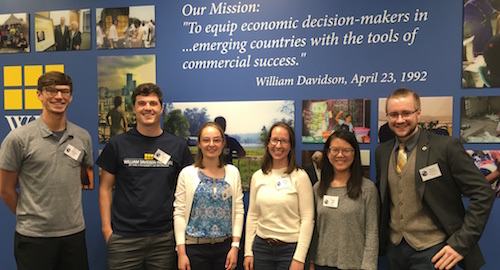
WDI’s 2018 summer interns before they set off on their voyages.
Over the years, WDI’s summer interns have faced unique challenges as they have conducted their work across the globe for the Institute and its partners. Impassable roads, extreme weather, the occasional wild animal. An active volcano can now be added to the list.
WDI intern Nadia Putri spent her summer in Bali, Indonesia working with East Bali Cashews on quality improvement projects, measuring the company’s impact on women and developing a U.S. market entry strategy. She also got an up close look at emergency preparedness.
“It was really beautiful, but a bit scary at the same time for someone who has never seen anything like it before,” she wrote of watching the sparks of lava and plume of smoke rise from the crater near where she was working. The cashew factory was outside the evacuation zone but management kept a daily eye on the volcano in case conditions changed. Earthquakes in the region have claimed nearly 400 lives during August.
Putri was one of six WDI interns working internationally this summer. Some, like Putri, have returned to the University of Michigan campus; others are finishing up their work and will be back in Ann Arbor soon. While overseas, the interns contributed to a blog to chronicle not only their work but also the experience of living in a foreign land. WDI has highlighted some of the work below and the full blog chronicling interns’ experiences is available here.
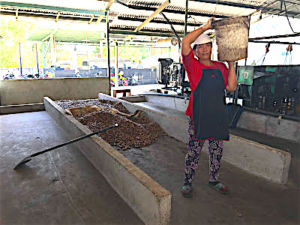
East Bali Cashews where Putri worked sources sustainably grown cashews from nearby smallholder farmers and processes them in a factory located in a remote village in one of Bali’s poorest regions. Since its launch in 2012, the company has integrated various social missions in and around its cashew processing operations, including community improvement and women’s empowerment.
Putri, a Ross School of Business MBA candidate, said factory workers were very supportive of her work and willing to explain how the company has impacted them. One employee recalled being hired after graduating from high school and is now in charge of 50 workers.
“At the factory, everyone is very welcoming and open to share their stories,” Putri wrote in her blog. “It’s especially humbling to see such high curiosity and willingness to learn from the factory employees. This serves as my daily reminder that (the) situation you grew up or lived in does not define who you could be.”
In Kenya, Andrea Arathoon, a School of Public Health graduate student, was tasked with helping a local maternity hospital reduce costs and increase patient volumes to achieve sustainability while also maintaining quality. One intervention Arathoon worked on for Jacaranda Maternity is a new outpatient care checklist for prenatal visits.
 The checklist is designed to improve patient processing within the outpatient clinic. This improved flow will reduce wait times and result in more efficient consultations, thus increasing patient volume and reducing costs, Arathoon wrote. She ensured the checklist followed the World Health Organization and Kenya Ministry of Health guidelines. The hospital’s doctors, nurses and administrative staff were consulted, and everyone was trained on how to properly use the new tool.
The checklist is designed to improve patient processing within the outpatient clinic. This improved flow will reduce wait times and result in more efficient consultations, thus increasing patient volume and reducing costs, Arathoon wrote. She ensured the checklist followed the World Health Organization and Kenya Ministry of Health guidelines. The hospital’s doctors, nurses and administrative staff were consulted, and everyone was trained on how to properly use the new tool.
“I am very excited about my summer project and the impact that it can have in improving maternity care for women and children in the country,” Arathoon wrote on the blog.
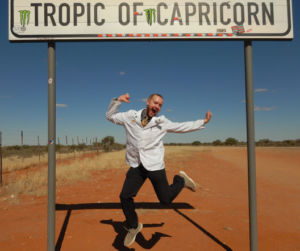
Across Africa on the Atlantic coast, Mason Benjamin is working in Namibia on pharmacy workforce development and hospital pharmacy practice. Benjamin, a College of Pharmacy graduate student, joined a collaborative project between WDI and the International Pharmaceutical Federation Hospital Pharmacy Section. The goal of the project, which includes the University of Namibia School of Pharmacy, is to increase the capacity of hospital pharmacists in Namibia through in-country diagnostics and technical assistance.
Benjamin has been traveling all across the country to visit hospital pharmacies in different regions to develop a landscape analysis of hospital pharmacy practices at both private and public hospitals. Before his site visits began, Benjamin attended the Medication Utilization Review In Africa (MURIA) conference, where he learned about pharmacy practice not only in Namibia but also across Africa.
“I was aware of how different the healthcare system in the United States might be from anywhere else in the world, but always felt that researching other systems online had its limits,” Benjamin wrote in the blog. “I much prefer to learn right from the source and in person, so I was grateful for the opportunity to ask questions to practicing pharmacists from over a dozen different African countries about how things worked in their setting.”
In India, the population of cities is expected to increase by 250 million people in the next 20 years, making employment a crucial need for the new transplants. Ross School of Business MBA student Chris Owen is working with MADE (Michigan Academy for the Development of Entrepreneurs) and its Madurai-based partner Poornatha, which is designing an affordable, world-class coaching curriculum for entrepreneurs in emerging economies. MADE was founded by WDI and U-M’s Zell Lurie Institute.
Owen is identifying best practices of existing coaching programs in India and other emerging economies, conducting a needs assessment of entrepreneurs in Madurai and developing a framework and training curriculum for how coaches will be identified, on-boarded and trained.
“By investing in strong local economies, India can address its dual-challenges of rapid urbanization and rising unemployment,” Owen wrote on the intern blog. “Indeed, for this reason, entrepreneurship in India – and the work of Poornatha – is becoming increasingly important.”
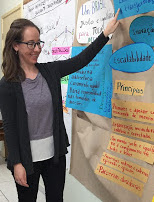 In Brazil, Rebecca Grossman-Kahn – a student at Ross and the U-M Medical School – is developing a tool to assess the social impact of the gender equality programs of Plan International’s Brazil office. Plan International has a long history of advocating for children’s rights but recently decided to focus its work in Brazil on promoting girls’ rights and equality. Gender roles in Brazil tend to be rigid and many girls stop studying in middle or high school to help with housework at home, Grossman-Kahn wrote on the blog. She attended a staff retreat to strategize on how to combat resistance from community members and organizations regarding Plan’s new focus on gender.
In Brazil, Rebecca Grossman-Kahn – a student at Ross and the U-M Medical School – is developing a tool to assess the social impact of the gender equality programs of Plan International’s Brazil office. Plan International has a long history of advocating for children’s rights but recently decided to focus its work in Brazil on promoting girls’ rights and equality. Gender roles in Brazil tend to be rigid and many girls stop studying in middle or high school to help with housework at home, Grossman-Kahn wrote on the blog. She attended a staff retreat to strategize on how to combat resistance from community members and organizations regarding Plan’s new focus on gender.
While at the retreat, a new World Bank report was released that showed girls who complete secondary education can expect to earn twice as much as those with no education.
“Studies like this can help get community leaders on board with Plan’s mission,” Grossman-Kahn wrote.
In Nepal, nearly two out of three working people are farmers. But the country’s rugged topography and lack of infrastructure makes it difficult to farm year-round despite a lengthy monsoon season. Additionally, in rural Nepal, only 5 percent of the population has reliable access to electricity. But the country has more than 300 days of sunshine, making it a perfect candidate for solar-powered agricultural services.
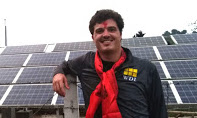 Matthew Carney, a dual degree student at Ross and the U-M School for Environment and Sustainability, spent the summer with the solar startup Ecoprise to help bring solar-powered agricultural services to subsistence farmers in the Terai region of Nepal that borders India. AgroHub, a pay-as-you-go service-based business model recently started by Ecoprise, provides access to solar-powered infrastructure for remote, underserved farming communities. These hubs provide farmers with access to equipment for irrigation, clean drinking water, food-processing and refrigerated post-harvest storage as a service.
Matthew Carney, a dual degree student at Ross and the U-M School for Environment and Sustainability, spent the summer with the solar startup Ecoprise to help bring solar-powered agricultural services to subsistence farmers in the Terai region of Nepal that borders India. AgroHub, a pay-as-you-go service-based business model recently started by Ecoprise, provides access to solar-powered infrastructure for remote, underserved farming communities. These hubs provide farmers with access to equipment for irrigation, clean drinking water, food-processing and refrigerated post-harvest storage as a service.
AgroHub has proved very successful for those farmers who have used it, allowing them to irrigate more land during the winter and monsoon seasons and reducing the use of diesel-powered water pumps that saves money. Carney’s task is to develop a plan to bring the service to farmers in western Nepal.
“Solar-powered agriculture presents an opportunity to raise the living standards of millions of rural Nepali farmers in a sustainable fashion,” he wrote. “It would be a shame to waste it.”